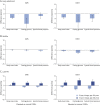Cardiovascular Risk Factors Across the Life Course and Cognitive Decline: A Pooled Cohort Study
- PMID: 33731482
- PMCID: PMC8166431
- DOI: 10.1212/WNL.0000000000011747
Cardiovascular Risk Factors Across the Life Course and Cognitive Decline: A Pooled Cohort Study
Abstract
Objective: Cardiovascular risk factors (CVRFs) are associated with increased risk of cognitive decline, but little is known about how early adult CVRFs and those across the life course might influence late-life cognition. To test the hypothesis that CVRFs across the adult life course are associated with late-life cognitive changes, we pooled data from 4 prospective cohorts (n = 15,001, ages 18-95).
Methods: We imputed trajectories of body mass index (BMI), fasting glucose (FG), systolic blood pressure (SBP), and total cholesterol (TC) for older adults. We used linear mixed models to determine the association of early adult, midlife, and late-life CVRFs with late-life decline on global cognition (Modified Mini-Mental State Examination [3MS]) and processing speed (Digit Symbol Substitution Test [DSST]), adjusting for demographics, education, and cohort.
Results: Elevated BMI, FG, and SBP (but not TC) at each time period were associated with greater late-life decline. Early life CVRFs were associated with the greatest change, an approximate doubling of mean 10-year decline (an additional 3-4 points for 3MS or DSST). Late-life CVRFs were associated with declines in early late life (<80 years) but with gains in very late life (≥80 years). After adjusting for CVRF exposures at all time periods, the associations for early adult and late-life CVRFs persisted.
Conclusions: We found that imputed CVRFs across the life course, especially in early adulthood, were associated with greater late-life cognitive decline. Our results suggest that CVRF treatment in early adulthood could benefit late-life cognition, but that treatment in very late life may not be as helpful for these outcomes.
© 2021 American Academy of Neurology.
Figures


References
-
- Institute of Medicine. Cognitive Aging: Progress in Understanding and Opportunities for Action. Washington, DC: National Academies Press; 2015. - PubMed
-
- National Academies of Sciences Engineering, and Medicine. Preventing Cognitive Decline and Dementia: A Way Forward. Washington, DC: National Academies Press; 2017. - PubMed
-
- Livingston G, Sommerlad A, Orgeta V, et al. Dementia prevention, intervention, and care. Lancet 2017;390:2673–2734. - PubMed
-
- Qiu C, Fratiglioni L. A major role for cardiovascular burden in age-related cognitive decline. Nat Rev Cardiol 2015;12:267–277. - PubMed
-
- Testai FD, Gorelick PB. Vascular cognitive impairment and Alzheimer disease: are these disorders linked to hypertension and other cardiovascular risk factors? In: Aiyagari V, Gorelick PB, eds. Hypertension and Stroke: Pathophysiology and Management. Humana Press, Springer International Publishing: 2016; 261–284.
Publication types
MeSH terms
Grants and funding
- RF1 AG054443/AG/NIA NIH HHS/United States
- K01 AG047273/AG/NIA NIH HHS/United States
- HHSN268201800005I/HL/NHLBI NIH HHS/United States
- HHSN268201800007I/HL/NHLBI NIH HHS/United States
- HHSN268201800003I/HL/NHLBI NIH HHS/United States
- HHSN268201800006I/HL/NHLBI NIH HHS/United States
- HHSN268201800004I/HL/NHLBI NIH HHS/United States
- HHSN268201500003I/HL/NHLBI NIH HHS/United States
- N01HC95159/HL/NHLBI NIH HHS/United States
- N01HC95160/HL/NHLBI NIH HHS/United States
- N01HC95161/HL/NHLBI NIH HHS/United States
- N01HC95162/HL/NHLBI NIH HHS/United States
- N01HC95163/HL/NHLBI NIH HHS/United States
- N01HC95164/HL/NHLBI NIH HHS/United States
- N01HC95165/HL/NHLBI NIH HHS/United States
- N01HC95166/HL/NHLBI NIH HHS/United States
- N01HC95167/HL/NHLBI NIH HHS/United States
- N01HC95168/HL/NHLBI NIH HHS/United States
- N01HC95169/HL/NHLBI NIH HHS/United States
- UL1 TR000040/TR/NCATS NIH HHS/United States
- UL1 TR001079/TR/NCATS NIH HHS/United States
- UL1 TR001420/TR/NCATS NIH HHS/United States
- HHSN268201200036C/HL/NHLBI NIH HHS/United States
- HHSN268200800007C/HL/NHLBI NIH HHS/United States
- HHSN268201800001C/HL/NHLBI NIH HHS/United States
- N01HC55222/HL/NHLBI NIH HHS/United States
- N01HC85079/HL/NHLBI NIH HHS/United States
- N01HC85080/HL/NHLBI NIH HHS/United States
- N01HC85081/HL/NHLBI NIH HHS/United States
- N01HC85082/HL/NHLBI NIH HHS/United States
- N01HC85083/HL/NHLBI NIH HHS/United States
- N01HC85086/HL/NHLBI NIH HHS/United States
- U01 HL080295/HL/NHLBI NIH HHS/United States
- U01 HL130114/HL/NHLBI NIH HHS/United States
- R01 AG023629/AG/NIA NIH HHS/United States
- R01 AG028050/AG/NIA NIH HHS/United States
- R01 NR012459/NR/NINR NIH HHS/United States
LinkOut - more resources
Full Text Sources
Other Literature Sources
Medical
